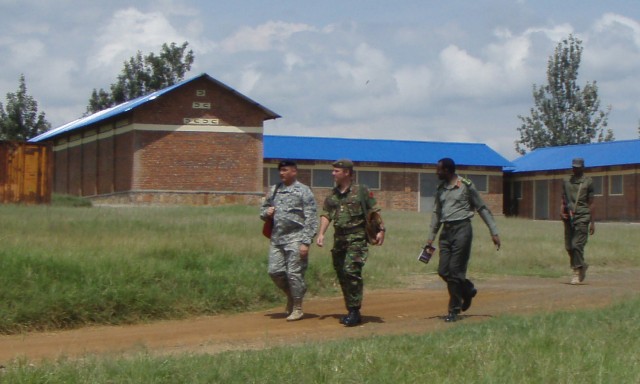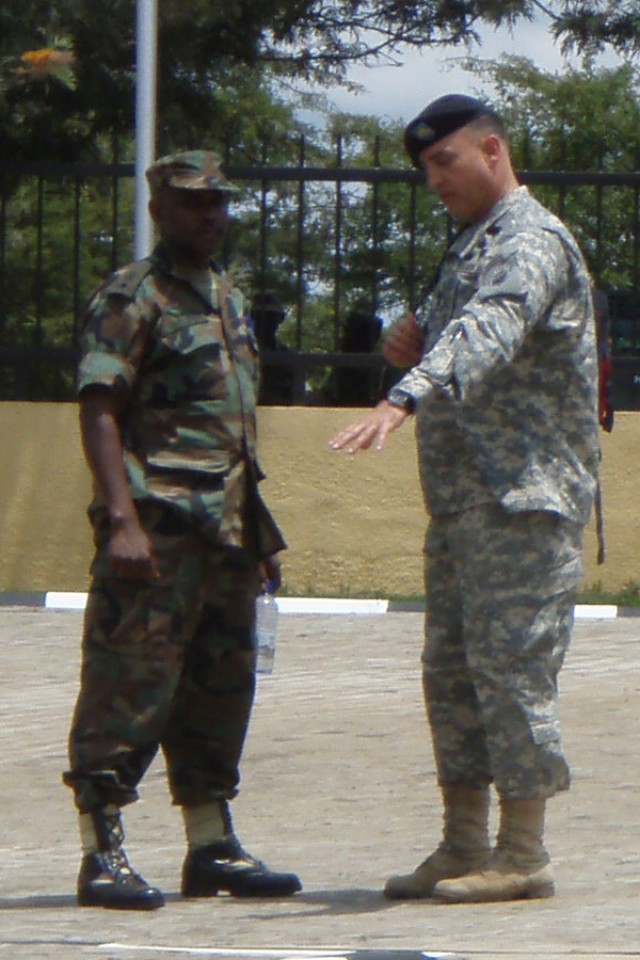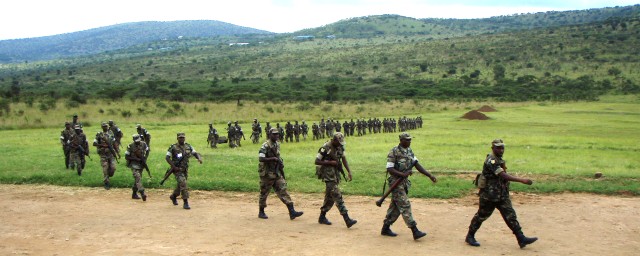VICENZA, Italy (May 8, 2009) -- Soldiers from U.S. Army Africa continue to build noncommissioned officer capacity in Rwanda through a partnership effort with British counterparts.
During a recent visit to Rwanda, senior U.S. Army Africa NCOs met with British and Rwandan officers to prepare for an upcoming assignment to mentor Rwandan NCOs on leadership.
"The Rwandan Defense Force requested an event for students who already have some leadership experience, something similar to our Warrior Leadership Course," said Sgt. Maj. Kellyjack Luman, U.S. Army Africa operations sergeant major. "Together, with the British military, we will offer a program to meet their needs."
The program, which is planned for later this year, will be carried out by British and American Soldiers at a training area near Kigali. In addition to leadership offerings, the month-long event will include a three-day field exercise, Luman said.
U.S. Army Africa, a component of U.S. Africa Command, partners with African nations to offer assistance that leads to more safe and prosperous environments on the continent. The U.S. team is working with the British Peace Support Team Eastern Africa - a unit that provides military advice, coordinates and supervises British and international assistance to national armed forces and regional structures in Central and Eastern Africa, said British Army Lt. Col. Stephen Segrave.
In 1994, Rwanda was devastated by mass killings that left hundreds of thousands dead and many more forced from their homes.
"In recent years, the RDF has earned a reputation for being a disciplined fighting force that is responsive to elected officials in support of peace and stability in their nation," Segrave said.
Rwanda is also committed to regional stability, as shown by their commitment of four infantry battalions to peacekeeping duties in Darfur, Segrave said.
"Their desire for professionalism and hunger to learn demonstrates a genuine aspiration to strive for perfection," Segrave said. "Both the U.K. and the U.S. recognize efforts made by the RDF. This partnership will build RDF leadership capacity."
Last July, the British military offered the RDF a course for junior non-commissioned officers. This upcoming course will focus on section commanders, Segrave said.
"Working together with U.S. Army Africa allows us to build a mutual understanding on how to help build capacity among nations in the Eastern Africa Region," Seagrave said.
The RDF has a superb training area, said Master Sgt. George Duenas, upon returning from a recent visit.
A native of Guam, Duenas, 42, is a maintenance supervisor assigned to U.S. Army Africa's logistics section. His first mentorship assignment in Africa was to Botswana in early 2008. He also worked with soldiers in Uganda. Duenas hopes his 22 years in the military -- much of that time spent leading Soldiers -- will help Rwandans to improve, he said.
"Providing insight into how U.S. Army NCOs conduct business is key," Duenas said. "We can pass on knowledge from our Army and the British Soldiers will offer their views. The RDF will be able to add that to their programs."
The Rwandan school, established in the early 1990s, offers training in basic soldier skills, a refresher course and some NCO training.
"The RDF commanding officer and his staff gave us a guided tour of their training base, with a historical overview and discussions about the Rwandan's current training mission," Luman said.
Programs like this, where U.S. and British militaries partner with an African nation, are coordinated through the local embassy in support of diplomatic cooperation. The U.S.-U.K. program will expose the Rwandan troops to another way of NCO development that they can incorporate into their own programs, Luman said. The U.S. NCOs have built a strong rapport with their Rwandan counterparts, through formal discussions and chats over dinner, Luman said.
"That bond will grow as we move forward with this program," Luman said.






Social Sharing